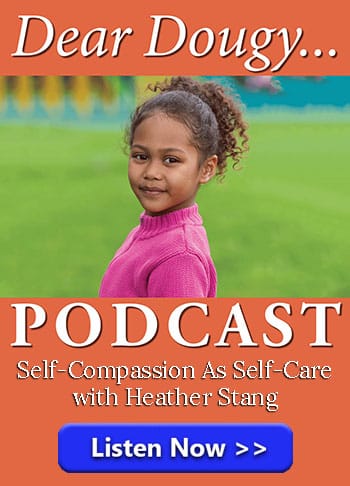Self-compassion as self-care also goes beyond the cookie cutter top 10 self-care lists that urge us to take bubble baths and enjoy a bit of chocolate every now and again. While these can be nice, they may not help us cope with the pain of grief.
An Attitude Of Kindness
I believe that true self-care also includes the attitude with which we engage these self-care activities. If we are simply going through the motions of self-care, without actually caring about our self, we’re missing the opportunity to nurture the most important relationship we have - our relationship with our self. We could even begin to think of self-care as self nurturing.
The way I see it there isn’t one right way to implement self-care. What I need to do to take care of myself is different than what you need to do to take care of yourself, and what you need today might be very different from what you need six months down the road. Life is fluid. Situations are impermanent. Part of practicing self-compassionate self-care is having the wisdom to be flexible.
The word compassion means to be with suffering. When we are engaging in a compassionate act, there is someone who is suffering, and there is the person with desire to alleviate the suffering. In the case of self-compassion, we are both the one who is suffering, and the one who can tend to the suffering. Self-compassion is about both awareness and action, where as self-care is more about the actions we take. The awareness – the attitude of self-compassion adds in a heart component.
We all know what we would want from a partner, or parent, or someone we care about when we are going through tough times. Self-compassion means we treat our self the way we would want to be treated. Or another way to look at it is to treat our self as we would treat someone we love unconditionally.
Instead of beating our self up, or engaging in self-criticism, we recognize that we are in pain and we ask ourselves “what can I do about this?”
Three Components of Self-Compassion
Self-compassion researcher Kristen Neff defines self-compassion as having three core components – self-kindness, common humanity, and mindfulness. Self-kindness simply means caring about ourselves, and being willing to take wise action to alleviate our suffering.
Common humanity is recognizing that all humans are in the same boat. Even though the details differ, all humans face grief and loss and vulnerability and failure. And we are all doing the best we can, given the circumstances of our life. This common humanity piece is what differentiates self-compassion from self-pity.
Mindfulness is about the ability to relate to our experience with a sense of balance or equanimity, a calm and clear mind – even when it feels like the rug has been pulled out from under us. We are able to be OK with the messy nature of grief – and let go of our expectations that things be any different than exactly as they are.
Common Self-Compassion Roadblocks You May Encounter
Just being a human being in the 21st century can make self-compassion seem illusive. Treating yourself with kindness is not a virtue that is celebrated in our culture - at least not yet anyway.
Add grief into the mix, and it is even more challenging. For one thing, the myths surrounding grief can get in the way. We might believe that there is a “right way” to grieve, and that we are doing it wrong. Self-criticism ensues. I see this all the time. I get calls from people who say they need help because they’re still ruminating about someone who died, they don’t feel like they can get it together. “I just don’t know what’s wrong with me.”
And there it is. Grief, a natural reaction to loss, suddenly becomes a sign of personal failure. We aren’t doing it right. This can get in the way of self-compassion, but it can also be a springboard for self-compassion. What can get in the way can also be the gateway in.
If you catch yourself evaluating how well you are grieving, remember that grief is messy. It isn’t supposed to be quick or easy. And there is no right way to do it. Your grief is as unique as the relationship you have with the person that died.
Another hindrance that stands in the way is our focus on the person who died, rather than ourselves. There’s not anything wrong with this, of course, it’s just what happens. Even if we had a solid self-care practice before loss, and maybe even practice self-compassion, grief can throw us off course.
Whether we had a loving relationship or a challenging one, it’s normal to revisit the past with regret. We time travel to previous discussions and interactions, and wonder “what could have done better?” It is natural to replay our actions and, with hindsight, consider how we could have done better. Be as easy on yourself as you can be.
I know from my own experience and from my students that we can be pretty hard on ourselves when someone close to us dies. Even me, with all my training and practice, I was pretty hard on myself for months after my stepfather died. And I am a so-called expert!
Self-Compassion as Self-Care for Grief Techniques
Be Your Own Best Friend
There are many ways to practice self-compassion when you are grieving. The first is to really listen to yourself. How to you treat yourself? Are you being as kind to you as you would be to a friend? If someone were treating you the way you are treating yourself, would you still hang around?
Self-criticism is often a habit – and habits require effort to break. Instead of beating yourself up when you are being tough on yourself – congratulate yourself each time you notice and choose to change course.
Formal Meditation Techniques
There are several mindfulness-based meditation techniques that can help you cultivate compassion. Lovingkindness & Compassion Practice, known as metta, and tonglen meditation, to name a few.
You can even simply spend a period of time imagining yourself as a small child in need of care, and send yourself some kind words.
One of my favorite ways to practice self-compassion when I am being self-critical or am facing a difficult emotion is to use a mindfulness-based technique that is called R.A.I.N. - which stands for recognize, allow, investigate, and nurture.
In this practice, you turn your attention towards your suffering, rather than away. The key to this practice is that instead of focusing on the ruminating thoughts in your mind, you allow your body to do the work. What does it really feel like in your body to feel the way you feel? What if you allowed this feeling to unfold, without censoring your truth?
Give it a try using the guided meditation below. Be kind to yourself during practice, and remember your breath can always help you return to the present moment if you find you get stuck in replaying thoughts about the past or worrying about the future. Just be present to what is happening now.
Self-Compassion Guided Meditation MP3
This Guided Self-Inquiry Meditation for Grief is approximately 16 minutes long. Find a place to practice where you will be undisturbed for this period of time.
Compassion for All (Including You) Guided Meditation MP3
This Compassion & Lovingkindness Meditation is approximately 19 minutes long. Find a place to practice where you will be undisturbed for this period of time.



